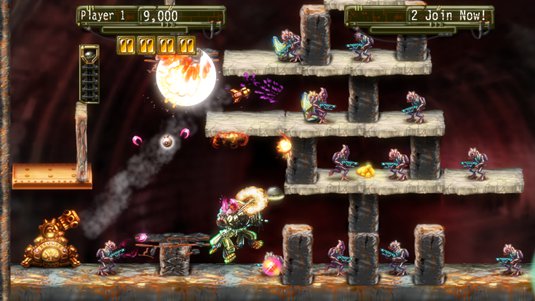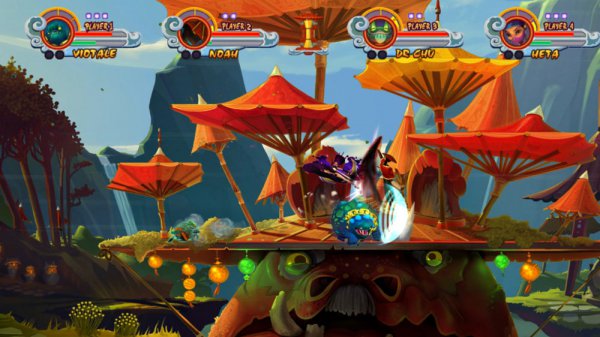This post has not been edited by the GamesBeat staff. Opinions by GamesBeat community writers do not necessarily reflect those of the staff.

Luke Schneider had 12 years of experience in the video game industry before leaving developer Volition, the Champaign, Ill. studio responsible for the original Red Faction and Saints Row series.
“I wanted to work on small, fast projects where I was mostly in control of the games,” Schneider said of his departure (via e-mail). So he saved his money, waited until the time was right, and started his own video game company — radiangames.
His indie studio consists of him and only him. Schneider has the freedom he wanted — needed — in order to make his games, and he’s done just that.
Since May of last year, Schneider's released six titles under the radiangames banner. They’ve totaled more than 100,000 downloaded trials and more than 30,000 sales.
The numbers are staggering as well as a certifiable badge of success for all of Schneider’s hard work. People are playing the games he creates. However, working at Volition gave him something he hasn’t fully acquired with independent development: financial security.
“I haven’t made enough in any particular month to cover all of my living expenses, but I have come close a couple times,” Schneider said. “It seems inevitable that I will make money if I keep releasing games and most of them continue to sell some copies past their release dates.”
Some days can be quite slow; Crossfire made one sale on its worst day in October. On the other hand, Inferno had about 450 sales in each of its first two days of availability.
 September was the best month, thanks to Inferno's great launch, and October’s sales held strong to net him a combined revenue of $8,398.86.
September was the best month, thanks to Inferno's great launch, and October’s sales held strong to net him a combined revenue of $8,398.86.
“In neither month did I actually make enough to cover all of my expenses,” Schneider posted in a November blog entry about his sales. “I’m 34 with a family and a house (and renting a small office), so the amount of money I need is higher than a single guy sharing an apartment.”
Microsoft’s quarterly pay periods — and the 30 percent cut the company takes — can make paying bills a bit tricky.
“It’s not ideal, but it’s the same deal that Xbox Live Arcade games get,” Schneider said of what he thinks is a reasonable model. “You get the money eventually, but most bills are monthly and it be nice to get monthly payments to make dealing with finances a bit smoother.”
Schneider develops exclusively on Microsoft’s Xbox Live Indie Games (XBLIG) service, but has considered other platforms.
“XBLIG is not the best way to make money if you want to do indie development,” Schneider said. “There are lots of other options, particularly with PC and mobile platforms, that make more financial sense."
“And of course getting a PlayStation Network or Xbox Live Arcade publishing deal is much more lucrative as well,” he added. “That said, just because I haven’t made a lot of money through XBLIG doesn’t mean it’s not possible to.”

Mommy’s Best Games, a popular indie developer, is in a similar boat.
“It can certainly be tough for us with bills, but with income from our games, some income from my wife’s job, and our savings, we’re doing OK,” Nathan Fouts, president of Mommy’s Best Games, said. “Mommy’s Best Games has been in business for three years so far and still rockin’ in the free world.”
Like Schneider, Fouts worked for a top-tier developer before moving into indie development on the Xbox 360. At Insomniac he was the weapons programmer and designer for the imaginary arsenal featured in Resistance: Fall of Man for PlayStation 3. Immediately prior to going indie he was programming bosses and helping to design Ratchet & Clank Future: Tools of Destruction.
His first release, Weapon of Choice, is his priciest title at $5 and has sold over 13,000 copies. Shoot 1up has sold over 23,000 copies at a buck a piece. His latest, Explosionade has racked up 4,200 sales in three months, which Fouts says is pretty good.
“It’s not Call of Duty: Black Ops, but then again I couldn't get Kobe to appear in any commercials for some reason,” Fouts joked.
Fouts is quick to point out the importance and challenge of marketing indie titles. His marketing for Explosionade was lacking in two areas: big-name media interest from sites like 1UP.com and Destructoid and a woeful downloadable demo version.

Nathan Fouts, president of Mommy's Best Games.
The free trial was too easy; it didn’t catch on with the hardcore audience. Media-wise, he only gave the game a three-week window to build hype. Fouts said three months is perfect, and developers have to plan the ideal time frame to release info to the press and nudge them for a story.
Mommy’s Best Games has a leg up on most indie developers, though. Outlets like Destructoid will review Fouts’ titles, and his studio has made a name for itself among the hundreds of indie devs on the 360. He also has an easy-to-navigate website with clear ways of contacting him for comments, press kits, or anything else a reporter, reviewer, or inquisitive fan may need.
Whereas Fouts is planning the best times to get coverage, David Addis of ESP Games is just trying to get a blurb about Miasma: Citizens of Free Thought on a major media outlet.
“I pursued most of the major gaming websites,” Addis said about his approach to marketing. “The hardest part is getting noticed at all, as they must have a swathe of tips and requests every day, but slowly they do seem to be picking up stories on the game.”
Wrangling press coverage isn’t the only difficulty for this Lionhead Studios employee. Unlike Fouts and Schneider, Addis is based in Guildford, England. He has to worry about paying taxes in the United Kingdom, and the cost of train tickets to the U.S. Embassy in London to apply for a tax ID number.
 He also bore more traditional costs, such as game assets, which totaled about £1,200 (about $1,800), and website hosting costs.
He also bore more traditional costs, such as game assets, which totaled about £1,200 (about $1,800), and website hosting costs.
Addis adds that if he were to pay anyone who worked on the game for his or her time — say, a very low hourly wage — it would cost about £6,000 (roughly $9,300). In one month he made back about half the cost of just the assets, and as of Jan. 4, Miasma has been downloaded 327 times, roughly equating to $1,635 in sales.
In fact, out of 5,001 demo downloads, the purchase rate is only 6.54 percent. Explosionade has had 15,500 demo downloads, with a 27 percent purchase rate.
Miasma's sales are slowing down, as it has been out of the new releases list — the list developers say shoppers peruse and purchase from the most — for quite some time.
“If it’s not in any of the main lists, it’s highly unlikely many people will find the game to download it,” Addis said. “You have a fairly brief honeymoon period in the new releases category.”
To make more money and give the game a wider audience, Addis released the title for PC. The sales have been lukewarm.
“The PC sales are very slow; I’m only selling the odd one,” Addis said. “I think the biggest problem has been marketing. I didn’t find Google AdWords to be particularly effective, so I might try some Facebook ads next.”
Without the sales, Miasma may not get a sequel, and therefore no closure to the dystopian sci-fi tactical RPG's cliffhanger ending.

David Addis, developer of Miasma.
Expanding game worlds, characters, and just making more games in general is why indie developers get into the business — they want to make exactly what they envision. This motivation is what drove developer Tribetoy to create Chu’s Dynasty.
Tribetoy consists of Camille Chu, Matthew Hoesterey, and Tara Rueping. Each has a day job in video game development, but each wanted to create a unique title.
 Chu’s Dynasty, a combination of Super Smash Bros. and Street Fighter injected with ancient-Chinese-inspired visuals, was born. Costs were low; the developers pitched in to cover rent, food, licensing, and software.
Chu’s Dynasty, a combination of Super Smash Bros. and Street Fighter injected with ancient-Chinese-inspired visuals, was born. Costs were low; the developers pitched in to cover rent, food, licensing, and software.
Chu’s Dynasty was also a part of the Indie Games Winter Uprising event, which provided great media exposure as well as rare Xbox dashboard placement for a number of indie developers.
Sales have been strong for their first title, although final sales will not deter the three from expanding upon the world and characters they’ve already created.
“We knew when we started making our game that it would have zero chance to pay for itself on the XBLIG marketplace,” said Hoesterey, designer, tech artist, programmer, and producer on the game. “Had we needed to pay our salaries, health insurance, and other benefits, Chu’s would have easily have cost more then $350,000 to make. No XNA game has made that much money, and I expect none will.”
“Fighting games are very expensive to make, and that is one of the main reasons not many indie fighters are made,” Hoesterey said. “We built the game knowing it would not make enough money to financially justify the time we spent building it.”

From left: Tara Rueping, Camille Chu, and Matthew Hoesterey make up developer Tribetoy.
While Hoesterey is quick to point out the team’s paychecks were the sole reason they were able to make the game, employment did have one giant pitfall: a lack of free time to build the title.
“Jobs allow us to make games without compromising for financial reasons, but they also mean we have less hours on a day-to-day basis to make them,” Hoesterey said.
Chu’s Dynasty took two years to complete. In that same time frame Fouts developed three titles; Schneider finished six games in eight months.
While the developers may face different situations and consequences when it comes to the financial impact of indie development, they still enjoy one thing: the freedom of making their own video games.
“I get to make console games with no concept approval, and there’s very minimal overhead in getting the games in front of an audience,” Schneider said. “I get to spend the majority of my time making cool games, and that’s what it’s all about.”
As Schneider, Fouts, Addis, and Tribetoy move onto their next projects, they keep money on their minds — but like any small-business owner and creative force, these developers will crunch, scrape, and fight to do what they love best: make their very own games for people to enjoy.
